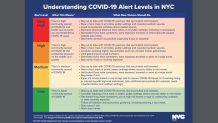Some of New York City's longstanding COVID-19 safety measures are going by the wayside, but its health officials have a new alert system ready to keep residents informed on the current virus threat.
On Friday, the same day the city's mayor and health commissioner announced an end to the "Key2NYC" policy that required proof of vaccination to enter most establishments, the health department released its new alert program.
The city plans to track the present threat of COVID-19 through a four-tiered alert system using red, orange, yellow and green to denote what New Yorkers should do to keep themselves safe.

Alert levels red (very high), orange (high), yellow (medium, and green (low), also reflect the level of community spread. Once the city reaches orange or red levels, its health care services are under extreme pressure.
As of its rollout, New York City was currently under a low alert level, according to the NYC Health Department.
Get Tri-state area news delivered to your inbox. Sign up for NBC New York's News Headlines newsletter.
If the city faces a rise in alert level, the health department says NYC officials will consider bringing back face mask requirements in high-risk settings and places where social distancing is not possible. They could also look at bringing back vaccine requirements for most indoor places.
"We will make proper public health decisions to keep our city safe. We will pivot if we see a reason to change any policies. We're going to be unafraid to make those adjustments and changes. COVID changes. It shifts, it modifies. We must be open to do the same," Mayor Eric Adams said.
The green, or low, alert level calls for the following prevention tips:
- Stay up to date with COVID-19 vaccines: Get vaccinated and boosted. Vaccines are available for everyone age 5 and older. Booster doses are available for everyone 12 and older.
- Consider wearing a face mask in public indoor settings where vaccine status is not known. Upgrade to higher-quality masks, including KN95, KF94, N95, or a cloth mask on top of a surgical mask. People who are at high risk of severe illness, who are over 65, or are unvaccinated will most benefit from this added layer of protection.
- Get tested. Testing is especially important if you have COVID-19 symptoms or were recently in contact with someone who tested positive for COVID-19, and before and after traveling or getting together with others.
- Stay home if sick or recently exposed. Follow all isolation and quarantine guidance, including wearing a face mask. COVID-19 is highly contagious. You can spread COVID-19 even if you do not have symptoms.
- Wash your hands. Wash your hands frequently with soap and water for at least 20 seconds, or use a hand sanitizer.

